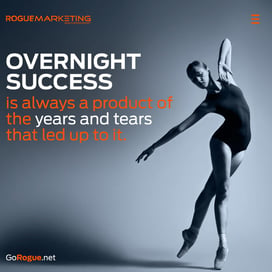WYWW(Live) Ep. 4 – Marketing Innovation Doesn’t Have to be Scary
Here we are with episode 4 While You Were Working (LIVE) talking about getting the edge in today’s fast-paced world of marketing.
4 min read
![]() Rogue Marketing
Aug 23, 2018 4:27:01 AM
Rogue Marketing
Aug 23, 2018 4:27:01 AM
We have written about it before. Marketing is a performance. That has served me well. Most of my life I’ve spent time performing on a stage. And I’ve taken those skills with me into my marketing career.
I remember being in my early twenties and working with a sound technician in advance of a concert that I’d be singing. I was doing my sound check – requesting lights be in certain places, music at certain volumes and was helping them know where I’d be at certain points in the song.
I’ve never forgotten what that sound tech said to me: “It’s all about aesthetics with you.”
I don’t think he meant it as a compliment, but as I mentioned, I was in my twenties.
 Although my approach has hopefully changed, I’ve certainly felt that at least some part of my persona is that of a showman. Coming through the ranks in the late 90’s and early 2000’s, marketers like me (and maybe you) were told that our job was to not let the leaders “know how the sausage was made.” They didn’t want the details and the steps, they wanted an elegant experience and valued just seeing the final product.
Although my approach has hopefully changed, I’ve certainly felt that at least some part of my persona is that of a showman. Coming through the ranks in the late 90’s and early 2000’s, marketers like me (and maybe you) were told that our job was to not let the leaders “know how the sausage was made.” They didn’t want the details and the steps, they wanted an elegant experience and valued just seeing the final product.
What things look like… and how they make someone feel is still important, but two decades later, it’s clear that business has taken a significant turn and definitely wants to be part of the sausage making.
Well kind of… At least that’s what they say.
Two Examples to Make You Say Hmmm…
Struggling to decipher how one should let a leadership team in on the sausage-making process, while also delivering a professional and polished expert-driven experience, I sought out examples that might hold some clues on just how that could work. I discovered that appearances do, in fact, matter. But here’s the key… it may just be an appearance.
Let me explain with two examples: one from Japan and the other from a still-running railroad passenger car.
If you’ve ever been to Japan you probably noticed two things:
After seeing a recent article pass through my news stream, I think I figured out why.
It seems that in most Japanese schools there is no full-time, paid custodial staff. The students, yes, the students, clean their classrooms and bathrooms. It’s actually a component of their education.

Incredible right? But just think how that foundation influences how they treat their environments as they grow up using them… and how that carries into their overall world as adults. It’s no wonder the streets are so clean.
I was also recently introduced to the Dover Harbor Pullman Company. Here the application was even more blatant. According to Wikipedia, the Dover Harbor is the oldest operating Pullman passenger cars in the US. It is a throw-back to years gone by with its sleeper-buffet-lounge amenities.
Stewards on the rail line are responsible for keeping the space tidy as you might expect… What you might not expect is the idea that one of the training managers shared.
It was an idea of the “appearance of clean.”
What exactly is that, you might be wondering? “It’s the idea that you want to do most of the cleaning behind the scenes, but you should do some cleaning in front of passengers.” As a company that prides itself on impeccable service, they want to be sure that passengers see staff working to make things look nice.
How do you help leadership understand the value marketing efforts bring and why things take longer or have more components than they realize?
They either need to be trained/exposed to the work personally (like the Japan example) … and/or they need to see some of the “sweat” you are putting into the task (Dover Harbor). When someone says they want to see how the sausage is made, it might not be that they REALLY want to see everything about how the sausage was made… just that they want to be involved in some of the steps along the way. Exposure to the steps and process instills value in the outcome.
While this may be easy(ier) to comprehend… it’s hard to do. There’s a lot that undergirds the appearance of clean in both those examples.
And what is true in the classrooms of Japan or an East Coast railroad track has application in your marketing efforts. The Rogue team is working to find the right balance itself. We’ve tried a few things that have helped us show the effort and sweat equity we’re putting forth that we share here:
In the end, aesthetics do matter. But buy-in matters more. What have you seen work in your efforts?
Here we are with episode 4 While You Were Working (LIVE) talking about getting the edge in today’s fast-paced world of marketing.

The political landscape is an incredible mirror of the culture and business world you and consumers operate in today. Though you may not have...